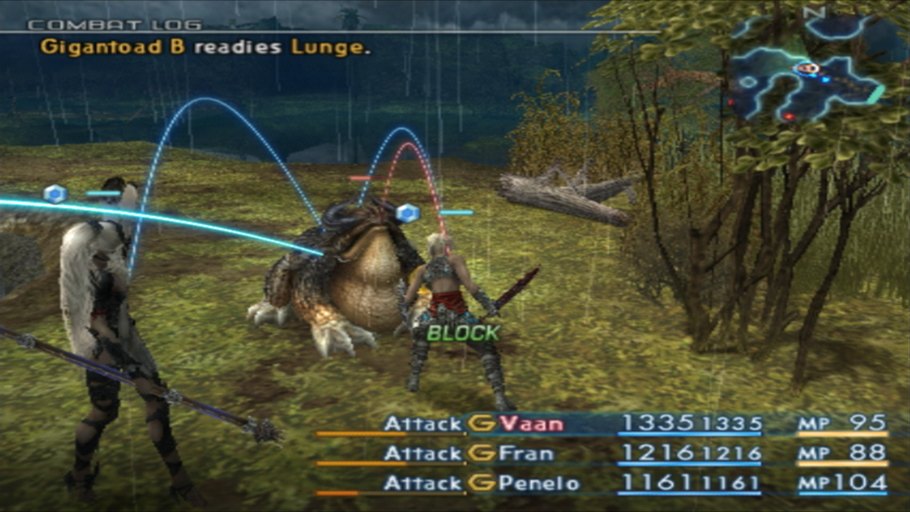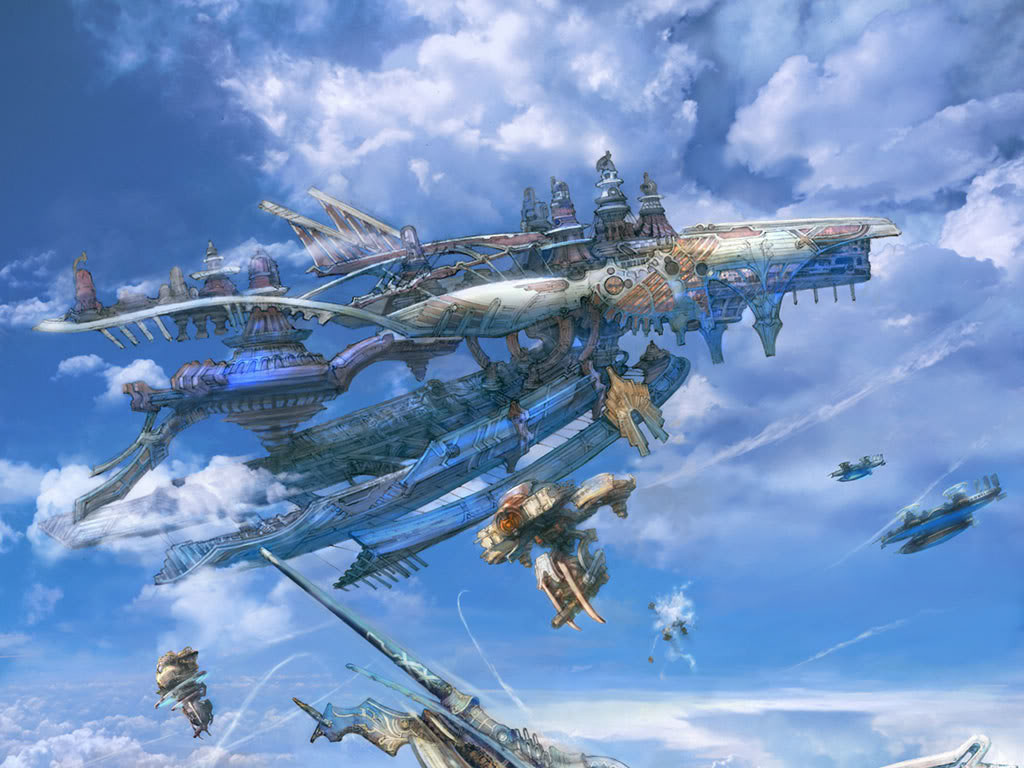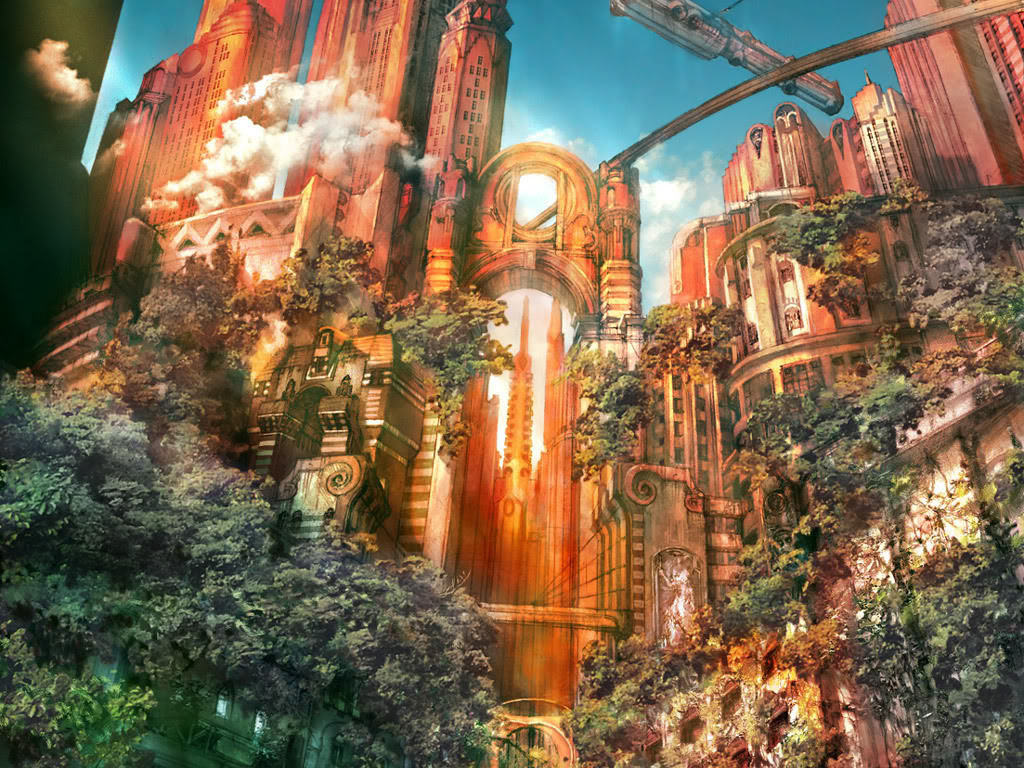This article is part of PS2 Week, a full week celebrating the 2000 PlayStation 2 console. To see other articles, go here.
///
The first time I played Final Fantasy XII (2006), I didn’t get it. I liked it, I think—there was something unusually elegant about the game’s stern, philosophical conversations about honor, and the long loping lines of its battle system—but I got halfway through, hit a boss battle of five little goblins that wrecked my shit with a panoply of status effects, and called it a day. I believe winter break was ending, anyway. I mused over my failure to a friend, and he was appalled. “Just grind it out,” he told me, before we stubbed out our cigarettes and headed back into the bar.
This advice—“just grind it out”—may as well be the slogan for the Japanese role-playing game. I’m not sure when I first came across the term “grinding,” intended as a catch-all for the long hours these games require in order to progress, but I immediately loved it, perhaps because of the endless Clipse jokes it facilitated. Grinding is the barrier to entry for a JRPG, a genre that locks gonzo narrative and aesthetic riches behind hours of sheer, exhausting repetition. Grinding is a fanciful name for an act of intentionally mind-numbing repetition: the player traverses a specific area repeatedly in order to engage in battles, thereby gaining experience points and growing stronger. You might find a good “grind spot” and spend an hour, steadily at work there. Its corollary is farming, which looks identical but in which the goal is the acquisition of a certain type of item rather than a certain type of point. Is this boring? It is boring. Grinding leads to strength, of a sort; farming leads to wealth, of a sort; both are, intentionally, punishing.
The grind is the central component of a JRPG; but, like sampling in popular music, it has refused to be confined to its origin genre, and has spread perniciously through almost every type of popular videogame. If you want to get better in a basketball game these days, you better hit the gym. If you want the top-tier guns in a shooter, you better have a few weekends to spend in multiplayer. The “clicker” genre of game isolates the grind to a single, curvilinear arc; Neko Atsume (2014) festoons that single line with cats and costumes and sprightly lounge music. MMOs take the concepts of grinding and farming to an illogical extreme, reasoning that if you’re going to spend your life rolling a boulder up a hill, you might as well join a guild. Destiny (2014), perhaps the most resonant title in the current videogame zeitgeist, combined the MMO and the shooter, enslaving a generation of young people in the process.

It is almost assumed that a player will comply. The grind is a surefire method of engagement, tapping into the same deep psychological impulses that keep people pulling the levers at a casino, or obsessively checking Twitter for fav-hearts. Each level we earn is a reward, and as those rewards become increasingly infrequent as our devotion to gaining them only increases. Eventually we rain hell on a field of merpeople, hours at a time, to move from level 45 to 46. These grinds are appealing to us on a deeply human basis, and I spent much of my adolescence in their thrall, but at some point I saw through the matrix, and swore them off. “I’m gonna die someday,” I’d grouse the moment a game demanded repetition, and then never play it again. Give me something short and designed or meaningfully hard, I reasoned; don’t only dare me to waste my weekend. That Final Fantasy XII and its band of merry hobgoblins demanded an afternoon spent grinding at all was reason enough to quit, as far as I was concerned. But something strange happened in the years afterward, as the grind seeped from the JRPG and contaminated so many other games: my feelings of animosity toward it softened. They were replaced, over time, by an easy, unhurried affection. A grind is like anything else in a videogame, I figured—an idea to be exploited, or just as easily refined. Bad grinds are a dime a dozen, hiding out in each minutely upgradeable ability or map full of collectible trinkets, not to mention the bargain-bin of cartoon-porn automatons currently filling the JRPG genre. But what, then, makes a good grind? I found a PlayStation 2 buried in my brother’s house recently, along with a gaggle of my old games. When those long blue lines started arcing and the stoic men began talking about war, I settled in, content to watch a handful of experience bars fill slowly, again and again, for dozens of hours. If there is such thing as a good grind, surely, it is Final Fantasy XII’s.
But why?
///
First, you have to commit, and getting there is harder than it may seem. There is a weird amount of turmoil around Final Fantasy XII. This is the case for every game unlucky enough to have the words “Final” and “Fantasy” in the title, but particularly true of this one, which is tagged in the history books as either underrated, experimental, or a travesty. Much of this is attributed to its fraught production, in which the fiercely cerebral game designer Yasumi Matsuno was brought in at the beginning only to be replaced by a more traditional company man later on. The story goes, among Final Fantasy XII apologists, that all of the good stuff is Matsuno’s, and all the shitty stuff his successor’s. Nowhere is this clearer than in the game’s bifurcated protagonists: Basch, a classically Matsunian protagonist of stolid demeanor and very serious concern, features prominently in the game’s intro, before the story detours to Vaan, a doe-eyed desert-boy who dreams of becoming a sky pirate.
Little of this is verifiable—Japanese game studios are a black box—but I’ll buy the narrative. Vaan was famously added to the game later in its production to appeal to younger players, and as such he can be almost entirely ignored, a protagonist relegated to popping in like Spritle and Chim-Chim from the back of the Mach 5 in Japanese racing anime Speed Racer. In one telling cutscene, Vaan appears to yelp “Race you to the beach!” to his pal Penelo, before Basch and a princess discuss royal bloodlines for several minutes. The game is riven between these two poles. Matsuno’s earlier works—Tactics Ogre (1995), Final Fantasy Tactics (1997), and Vagrant Story (2000)—are some of the most distinctly authored in the history of Japanese videogames, an impossibly rich stew of European history and JRPG melodrama, and Final Fantasy XII bears out many of those hallmarks. Allies of specious pasts join your party and fight nobly alongside you, only to peel themselves off upon a betrayal or noble disagreement. The games are fervently interested in the permeability of maps and the telling of histories; borderlines are seized and weighty books pored over. The games all feature economical menus, comic book font choices, and overcooked, feverishly nerdy translations. Final Fantasy XII, like its Matsuno predecessors, takes place in a sumptuous world, of vast, muted, naturalistic fields and timeworn cities drawn in gnarled, 45-degree hooks. Its dungeons represent an underworld inversion of these cities, at once more open and oppressively, envelopingly drab. Spending an afternoon in one of them has the deeply depressing feel of taking a bunch of pills, reemerging, and then taking some more, letting the murk rise back up to your neck. You wallow in it.
It’s great. The whole thing is great. I would recommend it fervently to anyone who likes all of the exact things I do and pretty much no one else. And yet: it does feel watered-down, compromised, as things drag on—not just Vaan, ending another cutscene with his fish-out-of-water yuckiness and his hands clasped incomprehensibly above his head, but the way those plot points of bloodlines and borders slowly get shaved into a mystical quest not even half as interesting. It’s like a bowl of gumbo that slowly turns into thin, reliable Campbell’s soup. One lavishly produced cutscene, early in the game and presumably while still under Matsuno’s supervision, is composed of a minutes-long monologue by a contentious new leader, making promises to the populace that seem too good to be true. It’s perfect Matsuno—political intrigue drawn in shades of gray. By the end of the game, that leader has turned into some sort of ancient, cartoon evil, soaringly repulsive.

This is where Final Fantasy XII apologists are thwarted. You want to like the game for its story, so much more somber and sober than any in the series’ prior entries, but it keeps giving you less and less to hold onto. Much Final Fantasy XII apologia focuses on the most distinctly Matsunian elements—the subtlety of its political setting, the decadence of its grammatical curlicues—but in the end, it’s Vaan who wins. The narrator that began the game was a king from a neighboring country of questionable allegiance; the narrator that ends the game is Vaan’s childhood friend, Penelo, speaking of dreams fulfilled. What keeps us playing, then, is not the story of the boy who wants to fly or the man who thirsts for honor, nor is it the princess or the sky pirate or the bunny lady (although the bunny lady is dope). What keeps us playing isn’t even the world, gorgeous and gray. We press on, like Matsuno’s noble knights, for the grind.
///
It begins with those arcing lines, blinking out of everyone’s heads the moment they step onto the first battlefield. Red lines spout from enemies, blue lines from your team, indicating each player’s current target. But these lines also represented a quiet revolution for the JRPG—a genre that, for all its narrative extravagance, upholds remarkably conservative design principles. Chief among them: a strict separation between the fields through which you run and the arenas on which you battle. You’d jog along in an old Final Fantasy, and then the game would decide it was time for you to fight, and so you’d be shuttled to another screen to take turns attacking a many-eyed pile of jelly before returning to the field. Final Fantasy XII’s first act of daring was to erase this delineation, letting you fight it out right on the field.
Its other revolution was closer to heresy—a fundamental rethinking of the grind as an aesthetic idea. In the 60 hours or so spent playing a JRPG, perhaps 40 of those are spent in idle, inconsequential combat. One might further break the grind up between the trigger—what the player does repeatedly—and the lure—why she does it. The trigger in most JRPGs is to navigate a menu and select some form of attack. This is an opportunity to feel quiet mastery over its systems, and which in recent years has also come to include draining jump-shots, shooting an alien in its pneumatic little face, and feeding a bunch of lovable cats. You pull the metaphorical trigger, again and again, in a grind, because of the lure, something tantalizingly out of reach. In the classic JRPG, this lure is incrementally better equipment and statistics, but it might also be radical flair or a transformative new ability. Recent Bethesda games like Fallout 4 (2015) and The Elder Scrolls V: Skyrim (2011) hide comical powers at the top of their skill trees, while MMOs and dungeon crawlers let players festoon themselves in ever-more ridiculous assemblages of equipment. (The Persona games, memorably, combined traditional JRPG triggers with “hitting on classmates,” and combined traditional JRPG lures with “having sex with those classmates.” Somehow, they are some of the finest games ever conceived.) Many words have been written about why people play the games they do, and the lure of a grind is one of the clearest places to see those motivations at work. Why, exactly, would someone suffer such monotony? We also call going to work “a grind,” after all.
When we typically talk about the grind in videogames, then, we talk about how good the trigger feels, and how much desire the lure inspires. Final Fantasy XII gives zero shits about either of these. The lure is a board of unlockable abilities, initially appetizing but devoid of meaningful surprises. More daringly, the trigger is removed entirely. A standard JRPG’s combat, with each player and enemy taking turns attacking, upheld stately rules of battle, built on the mold of tabletop gaming. In Matsuno’s prior games, war was fought by tired, conflicted soldiers in swamps and forests and deserts, still taking turns but wading waist-deep through thickets of mud before doing so. In Final Fantasy XII, however, all of this is swept aside in favor of a system of gambits, which allow the player to program all of her characters. The gambits kick into action the moment the player is near an enemy—those red and blue lines start arcing up and out, action without the pull of a trigger. Final Fantasy XII’s critics balked, likening this to autopilot. You might tell an ally to attack an enemy on sight, and to heal teammates when weak. Ah, but in which order? And at how little health? At first, the gambits ask simple questions, but as the game moves on, more gambit slots open up, and divisions of labor take shape: perhaps the bunny lady hangs out with a crossbow at the rear, almost endlessly healing the princess, who is an angel of death; perhaps Penelo, god bless her, runs around stealing shit. The possibilities for roles aren’t quite endless, but you author them for your characters, hour after hour, in seemingly infinite variations. Each new locale represents a new mix of needs, and a slight reenvisioning of the programming of your team. The great rusty oil derricks of the Ogir-Yensa Sandsea force an aggressive pattern of healing, while the towering, labyrinthine spire of Pharos necessitates focused attacks.

But without buttons to press, what exactly are we even doing here? The grind always looks absurd to a spectator. Matsuno’s previous titles at least engaged in a sort of topographical intrigue, with enemies taking positions atop houses and retreating through alleyways, but in Final Fantasy XII, your characters will go so far as to position themselves on the field for you. And so for hours at a time—say, the hours I spent grinding before finally slaying those five giggling hobgoblins—the player merely moves the joystick toward the nearest enemy, watching the designed system kick into action. But this is where I might observe a third quality to the grind, sitting at the intersection of the trigger and the lure: its texture. The way the player strategizes toward that growth; the way the player is lead to understand the machine. The texture is the feel of an afternoon spent in the grind’s thrall. Because in practice, and with hindsight, Final Fantasy XII feels like the hale, staid JRPG, at the peak of its commercial popularity but just years before entering a period of long artistic neglect, reaching out wildly for new influences—synthesizing at once the onfield action of an MMO, the menu-driven perfection of a strategy-RPG, the slow crawl toward strength of the classic JRPG, and, in boss battles, the stop-and-start rhythm of a computer RPG. It is designed not around instant rewards or even eventual rewards but around the feel of the grind—nothing more and nothing less. It thinks in geological terms, confident that your understanding of mechanics is big—that you can feel the gears shifting at an almost imperceptible speed. That you could sit back and do nothing was perceived as the game’s greatest problem; it ends up being its richest reward.
///
A recently released videogame—okay, Far Cry Primal—stopped me, an hour or so in, to explain the process I would go about to upgrade my owl abilities. I envisioned immediately the moment, a few hours down the road, when an owl-related challenge would seem simply too much, and I would think: “I need to upgrade those owl abilities.” I quit instantly, of course. I will die someday, I thought, and my owl will be upgrade-free—a baby owl, unsuited to murder. This felt both fine and fair. A bad grind is worth quitting on. It feels terrific to stare at a huge platter of lures splayed out for your approval and to simply decline. I’m not sure which is more dispiriting: the way so many videogames impose the grind on players, or the notion that players have demanded grinds from videogames, ballooning out their runtimes in a tireless min-maxing of gameplay-per-dollar. The result, today, is more videogame than anyone could ever play, all eager-to-please and oozing content from every orifice. Final Fantasy XII is almost exactly a decade old, but in this context its most controversial ideas are more relevant than ever. The game asks only that we take our own time seriously, and spend it as if its supply were not infinite.
